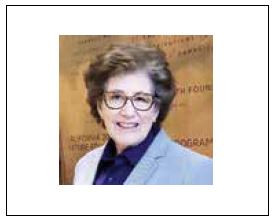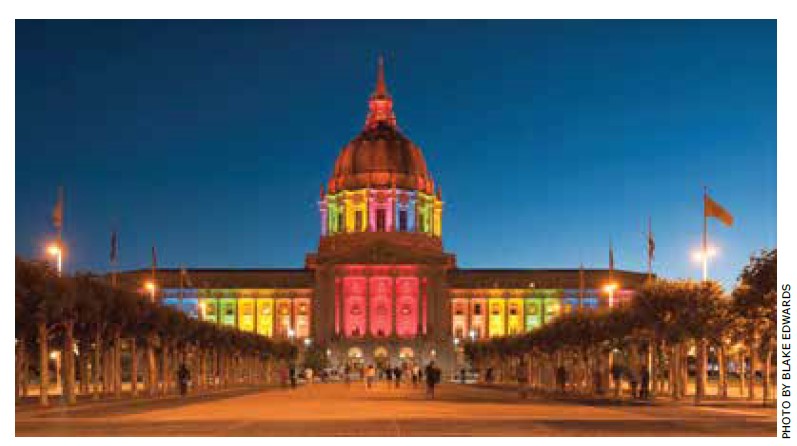
By Dr. Marcy Adelman–
At the beginning of the pandemic in March 2020, the city of San Francisco mandated that residents shelter-in-place. It was a stressful time, but some communities and parts of communities were more challenged than others. The LGBTQ Aging Research Partnership, Tom Nolan, Dr. Karyn Skultety, Jesus Guillen, and I joined with Health Management Associates to develop and implement an online survey in February 2021 to understand how LGBTQ older adults were faring during this time in the pandemic. The survey focused on physical health, emotional well-being, and accessibility of needed services and was funded by the San Francisco Department of Disability and Aging, the Horizons Foundation, and the Bob Ross Foundation.
Five hundred San Francisco LGBTQ adults over the age of 50 responded to the survey. Nearly 3/4 of respondents identified as white. Over 8% identified as Latino, Latinx or Hispanic; five percent identified as Asian; and 4.6% identified as Black or African American. A smaller percentage of respondents, 2.8%, identified as American Indian or Alaska Native. Almost 20% of all respondents said they were able to meet their basic needs with some help and 9% reported they didn’t have enough income to meet their needs.
The survey found that while most LGBTQ older adults were managing well in the stressful time of the pandemic and the imposed isolation of the stay-at-home orders, many felt challenged by mental distress and the lack of access to mental health services. During this time, depression, feelings of loneliness, isolation, and post-traumatic stress symptoms significantly increased. Black Indigenous People of Color (BIPOC) LGBTQ older adults reported the highest rates of depression, stress, and post traumatic symptoms as well as greater lack of access to mental health services.

The percentage of LGBTQ older adults with self-reported symptoms of depression increased to 13.5%, almost 3 times more than during the pre-pandemic experience. Isolation increased, as 11% of LGBTQ older adults reported they had three or more days with no contact with another person during the pandemic, compared to less than 4% beforehand. Loneliness and the degree of loneliness also increased, with 20% of all respondents scoring at the highest rate possible on the UCLA Loneliness Scale.
Over 43% of all LGBTQ respondents self-reported post-traumatic stress symptoms. BIPOC LGBTQ older adults reported the highest percentage of people with post-traumatic stress symptoms, 52.3%, followed by LGBTQ older adults with a disability at 52%, HIV+ respondents at 50%, and Transgender Non-Conforming (TGNC) older adults at 46.3%. More than 40% of cisgender and white respondents self-reported post-traumatic stress symptoms. By comparison, the prevalence of Post-Traumatic Stress Disorder (PTSD) in the general adult population pre-COVID ranges from 6 to 7% and increased to 15% during the pandemic.
Disparities in the mental and physical health of sexual and racial/ethnic minorities has been well documented. These disparities can be understood as a consequence of minority stress from multiple negative experiences and traumas encountered over the course of their lifetime, for example, stigma, discrimination, sexism, heterosexism, and rejection from family, etc. BIPOC LGBTQ older adults and BIPOC TGNC older adults, in particular, report higher rates of both historical and current traumatic experiences of transphobia, racism, and violence, and are more likely to have poorer health and to experience more mental distress than white cisgender LGBTQ older adults.
Most survey respondents were able to access services needed, such as medical care, help with chores, help securing medication, economic assistance, and technology assistance, but many were not able to access needed mental health services. Almost 17% of all survey participants reported they wanted counseling services but were unable to access these services. The most common reasons for not accessing counseling services were lack of affordability and not knowing how to go about finding a therapist. More than 18% of TGNC respondents and slightly more than one in four BIPOC LGBTQ respondents, HIV+ respondents, and LGBTQ people with disabilities reported they wanted counseling services during the pandemic and shelter-in-place, but were unable to access these services. This is a significant and concerning gap in LGBTQ senior services.
Shireen McSpadden, Director of the San Francisco Department of Homelessness and Supportive Services and former Executive Director of the Department of Disability and Aging, remarked: “This survey provides unsurprising yet valuable information about the need for culturally appropriate mental health services for LGBTQ+ older adults, especially those who identify as Black Indigenous People of Color.”
A majority of all respondents, 83%, increased their use of virtual communications during the pandemic. More than 75% of respondents who received telehealth services during COVID-19 and the stay-at-home mandate said they are likely or somewhat likely to use these services again in the future. These results affirm the viability of telehealth as a means of delivering services.
Respondents were asked to rate their physical health both now and a year ago, prior to the COVID-19 pandemic. The majority of respondents rated their health from good, to very good, to excellent (75%), and one fourth rated their health from poor to fair. A little over half of all respondents (53%) reported their health had not changed in the past year. One third of respondents reported their health as somewhat worse and much worse than a year ago. During shelter-in-place, half of all respondents reported they ate more, 1/3 slept more, and 2/3 exercised less. All of these behaviors can have a negative impact on long-term health.
In April 2021, when most older adults in San Francisco were eligible to be vaccinated, a follow up survey was conducted to ask how people were doing and what had changed for them in terms of mood and stress. One hundred respondents from the previous study participated. Ninety-four percent reported having been vaccinated. Although almost one in four said they experienced no change since the vaccine roll out, 68% of respondents reported feeling better. They reported positive takeaways from their experience such as a desire for deeper connections, a commitment to live more authentically, and a desire to enjoy life more and have more appreciation for everyday joys.
Dave Knego, Executive Director of Curry Senior Service, said, “Service providers need this survey data to see how we can best respond to the needs of our clients. At Curry Senior Center, that means responding to the mental distress and isolation that LGBTQ+ older adults are experiencing by designing a city-wide program that will connect community members with culturally competent mental health providers to reduce emotional distress as well as to provide referral to LGBTQ senior serving community-based nonprofits to offer other supports as needed. The pandemic may be on the decline in San Francisco, but the long-term psychological impact is likely to be here for some time. The results of this survey provide a road map for reducing the city’s gap in mental health services for LGBTQ older adults.”
Dr. Marcy Adelman, a psychologist and LGBTQ+ longevity advocate and policy adviser, oversees the Aging in Community column. She serves on the California Commission on Aging, the Board of the Alzheimer’s Association of Northern California, the California Master Plan on Aging Equity Advisory Committee, and the San Francisco Dignity Fund Oversight and Advisory Committee. She is the Co-Founder of Openhouse, the only San Francisco nonprofit exclusively focused on the health and well-being of LGBTQ+ older adults.
Published on July 15, 2021
Recent Comments